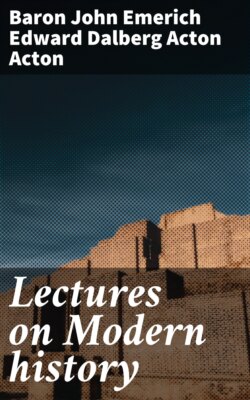Lectures on Modern history

Реклама. ООО «ЛитРес», ИНН: 7719571260.
Оглавление
Baron John Emerich Edward Dalberg Acton Acton. Lectures on Modern history
Lectures on Modern history
Table of Contents
NOTES TO THE INAUGURAL LECTURE ON THE STUDY OF HISTORY
I. BEGINNING OF THE MODERN STATE
II. THE NEW WORLD
III. THE RENAISSANCE
IV. LUTHER
V. THE COUNTER-REFORMATION
VI. CALVIN AND HENRY VIII
VII. PHILIP II, MARY STUART, AND ELIZABETH
VIII. THE HUGUENOTS AND THE LEAGUE
IX. HENRY THE FOURTH AND RICHELIEU
X. THE THIRTY YEARS' WAR
XI. THE PURITAN REVOLUTION
XII. THE RISE OF THE WHIGS
XIII. THE ENGLISH REVOLUTION
XIV. LEWIS THE FOURTEENTH
XV. THE WAR OF THE SPANISH SUCCESSION
XVI. THE HANOVERIAN SETTLEMENT
XVII. PETER THE GREAT AND THE RISE OF PRUSSIA
XVIII. FREDERIC THE GREAT
XIX. THE AMERICAN REVOLUTION
APPENDIX. APPENDIX I
Отрывок из книги
Baron John Emerich Edward Dalberg Acton Acton
Published by Good Press, 2019
.....
Ranke relates, without adornment, that William III ordered the extirpation of a Catholic clan, and scouts the faltering excuse of his defenders. But when he comes to the death and character of the international deliverer, Glencoe is forgotten, the imputation of murder drops, like a thing unworthy of notice #96. Johannes Mueller, a great Swiss celebrity, writes that the British Constitution occurred to somebody, perhaps to Halifax. This artless statement might not be approved by rigid lawyers as a faithful and felicitous indication of the manner of that mysterious growth of ages, from occult beginnings, that was never profaned by the invading wit of man #97; but it is less grotesque than it appears. Lord Halifax was the most original writer of political tracts in the pamphleteering crowd between Harrington and Bolingbroke; and in the Exclusion struggle he produced a scheme of limitations which, in substance, if not in form, foreshadowed the position of the monarchy in the later Hanoverian reigns. Although Halifax did not believe in the plot #98, he insisted that innocent victims should be sacrificed to content the multitude. Sir William Temple writes: "We only disagreed in one point, which was the leaving some priests to the law upon the accusation of being priests only, as the House of Commons had desired; which I thought wholly unjust. Upon this point Lord Halifax and I had so sharp a debate at Lord Sunderland's lodgings, that he told me, if I would not concur in points which were so necessary for the people's satisfaction, he would tell everybody I was a Papist. And upon his affirming that the plot must be handled as if it were true, whether it were so or no, in those points that were so generally believed." In spite of this accusing passage, Macaulay, who prefers Halifax to all the statesmen of his age, praises him for his mercy: "His dislike of extremes, and a forgiving and compassionate temper which seems to have been natural to him, preserved him from all participation in the worst crimes of his time."
If, in our uncertainty, we must often err, it may be sometimes better to risk excess in rigour than in indulgence, for then at least we do no injury by loss of principle. As Bayle has said, it is more probable that the secret motives of an indifferent action are bad than good #99; and this discouraging conclusion does not depend upon theology, for James Mozley supports the sceptic from the other flank, with all the artillery of the Tractarian Oxford. "A Christian," he says, "is bound by his very creed to suspect evil, and cannot release himself. … He sees it where others do not; his instinct is divinely strengthened; his eye is supernaturally keen; he has a spiritual insight, and senses exercised to discern. … He owns the doctrine of original sin; that doctrine puts him necessarily on his guard against appearances, sustains his apprehension under perplexity, and prepares him for recognising anywhere what he knows to be everywhere." #100 There is a popular saying of Madame de Stael, that we forgive whatever we really understand. The paradox has been judiciously pruned by her descendant, the Duke de Broglie, in the words: "Beware of too much explaining, lest we end by too much excusing." #101 History, says Froude, does teach that right and wrong are real distinctions. Opinions alter, manners change, creeds rise and fall, but the moral law is written on the tablets of eternity #102. And if there are moments when we may resist the teaching of Froude, we have seldom the chance of resisting when he is supported by Mr. Goldwin Smith: "A sound historical morality will sanction strong measures in evil times; selfish ambition, treachery, murder, perjury, it will never sanction in the worst of times, for these are the things that make times evil—Justice has been justice, mercy has been mercy, honour has been honour, good faith has been good faith, truthfulness has been truthfulness from the beginning." The doctrine that, as Sir Thomas Browne says, morality is not ambulatory #103, is expressed as follows by Burke, who, when true to himself, is the most intelligent of our instructors: "My principles enable me to form my judgment upon men and actions in history, just as they do in common life; and not formed out of events and characters, either present or past. History is a preceptor of prudence, not of principles. The principles of true politics are those of morality enlarged; and I neither now do, nor ever will admit of any other." #104
.....